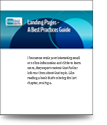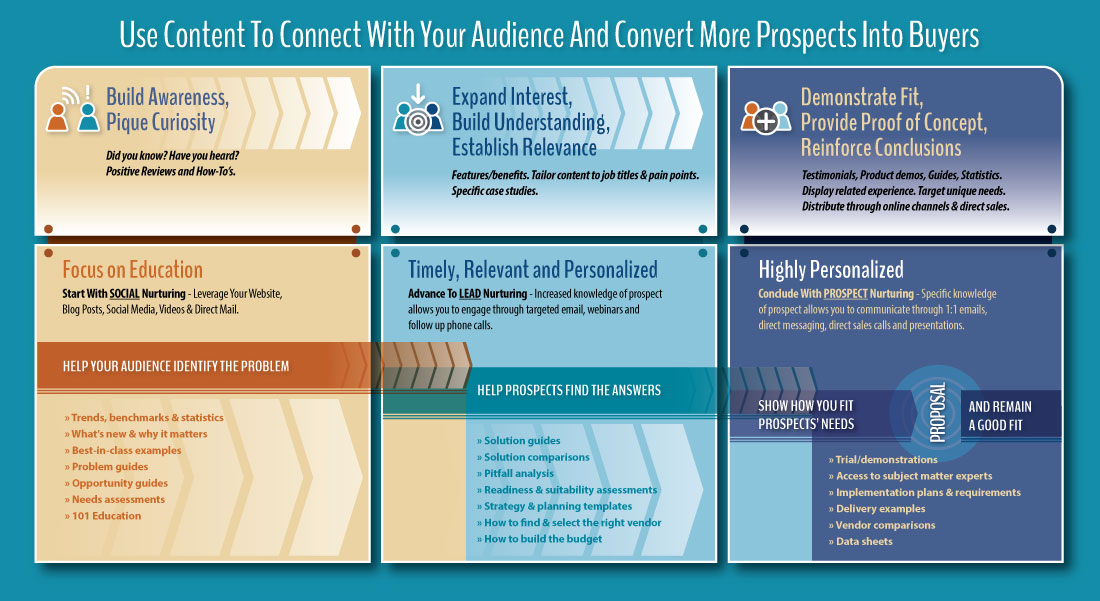
It's 1966. How did you get more prospects to consider buying the products you produced? If you were a big brand, you upped advertising. An increased budget increased sales. B2B companies put feet on the street. More calls translated into more meetings. A few of those meetings turned into sales. Rinse and repeat.
It's 2016. For todays buyers, those tactics don't translate. It's estimated that contact with a prospective supplier doesn't occur until the buyer is nearly 2/3 through their "buying journey." They formulate purchasing decision through a self education process.
Providing outlets for prospects to learn about your capabilities and the value they provide, are essential. That's why content marketing is important to your business.
What is Content Marketing?
You may have heard the term Content Marketing and not understood its meaning or importance. But regardless of your knowledge, it's likely you have been a participant. Facility tours. A printed guide that educates customers on the value print delivers to a marketing operation. A spec sheet that details how to design for digital vs. offset. A label material guide that lists face stocks, adhesives and the best fit given the conditions you expect them to operate in.
These are all examples of content marketing.
Whether offline or online. Analog or digital. In person or virtual. Effective content marketing creates interest, relevance and relationships with customers by producing, curating and sharing content that addresses specific customer needs and delivers visible value. The intent is not to deliver instant sales. Instead content marketing educates and builds understanding. It's designed to attract and retain a clearly-defined audience and drive profitable customer action. (Definition from Content Marketing Institute)
The First Content Marketer
In the early 1900s John Deere developed a magazine called The Furrow. Its purpose, assist farmers with common challenges, offering helpful advice on how to improve production and grow their business. What did John Deere receive in return for the free advice? Only the hope that some of the excess profits they helped farmers generate would be spent on John Deere tractors and other farm implements. And that's exactly what occurred.
Other early examples include:
- The Michelin Guide. You may have dined at a Michelin rated restaurant but the guide originated in 1900 to help drivers maintain their cars and find places to eat while they were traveling.
- The RR Donnelley Lakeside Classic. This annual book of American history narratives started in 1903 and demonstrated developments in fine book making.
- Burns & McDonald, an engineering and consulting firm, has produced the Benchmark since 1913. Similar in context to The Furrow, it provides useful information on water and power systems for public entities like the government, military and municipal entities.
The Evolution Of Content Marketing
Although publications similar t0 these examples were somewhat common, bigger brands found advertising a more powerful medium. Ads drove revenue and continued to do so until the Internet and software took hold. Now instead of information finding the consumer, the consumer finds the information.
As businesses published valuable information online, the standard became to look online first. Plus, the era of permission marketing had arrived. Interruption marketing took a back seat. Consumers wanted useful, relevant, meaningful information when and where they wanted it.
Is Content Marketing Important To Your Business?
Content marketing is the vehicle that allows you to compete in a way that was impossible before the Internet.
Buyers seek website content, blog posts and information through other channels such as industry forums and relevant social media. To impact your audience today, you need to be located in the places they frequent.
Effective content marketing allows you to attract and nurture prospects, generating leads and buyers.
How You Can Leverage Content Marketing
Buyers advance through various stages before they are ready to make a purchasing decision. Developing information that educates, builds understanding and demonstrates fit is crucial to positioning your business. Much like The Furrow educated farmers on new technology and how they could be more successful business owners, so should your content.
However you don't need a monthly magazine. Helpful information both online and offline will build that same type of relationship with your audience.
What topics are helpful? Consider these questions.
- What is it that would cause someone in your audience to need you?
- What pain points are they facing?
- How can you help them solve that problem?
- Why are you better than the status quo?
- Why are you better than the competition?
So the key in marketing your business is to develop the type of useful information you've done in the past and then amplify it online.
Why Should You Embrace Content Marketing?
If you need to expand your audience. If you can use more leads. If you are trying to grow your organization then a content plan will help you reach those goals.
The printing industry has a close link to content marketing. You help your clients tell the story that connects them with their customers. Take the opportunity to apply those same practices.
What is content marketing? An effective way to generate leads and expand your business.




 Insight Delivered Directly to You Interesting topics, great offers and free marketing tools.
Insight Delivered Directly to You Interesting topics, great offers and free marketing tools.

